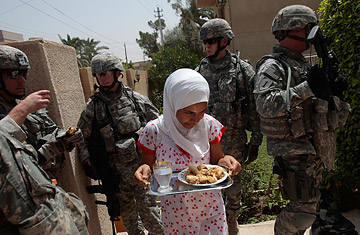
An Iraqi girl turns away after serving pastries to members of the 1st Squad, 4th Cavalry Regiment of the 1st Infantry Division as they go house to house in the tense Dora neighborhood in Baghdad.
When Colonel James R. Crider's 1-4 cavalry squadron got to Baghdad last May, their first 30 days were pockmarked with roadside bombs, shootings and grenade attacks. But the war stories out of Crider's outfit nowadays don't have much to do with war anymore. For the past three months there hasn't been a significant incident. These days Crider's unit has their hands full with conflicts of a completely different nature — the kinds of problems that child and social welfare services may be better equipped to deal with.
There was the drunken husband who got mouthy with his wife — she beat him with a frying pan, sending him stumbling and bleeding into the street, where one of Crider's platoons came upon him and stitched him up. Then there was the young man with a mental condition whose brother blasted him with a homemade shotgun because he wasn't taking his medicine. Crider's men heard the shot and came running. No one was really hurt and the young man is now working at a local grocery store. Then there was the time a local distinguished community leader complained to Crider's men that his son was addicted to pharmaceuticals and asked them to intervene. The Americans staged an intervention, scaring the young man straight with a fake urine test result.
"Counterinsurgency is all about the people," says Crider. And residents of the predominantly Sunni neighborhood called Dora don't trust the Iraqi government, believing that the Shi'ites who run it are controlled by Iran. They trust the Americans instead. "When you realize they think we are the government then we need to take the initiative. They think if we can launch a missile from the Persian Gulf and destroy Saddam's palaces we can do anything." Like throw a switch and provide 24-hour electricity across the Iraqi capital. They look at us, says Crider, and think, "You're are the ones with the guns, with the money. To this day they believe we can do anything."
Even the Iraqi police call on Crider's men for help. The Americans have good rapport with neighborhood residents — while the police, staffed with outsiders, are generally mistrusted. And so one day the cops called in a panic. There had a been a kidnapping: someone was missing. What were they to do? Crider's men found out that the kidnapping was a case of older brothers defending a younger sibling from a bully by tying up the bully with string and tossing him into a school bathroom, where no one bothered to look for four hours.
The Americans have also become the vice squad. At one point, they had to shut down a house full of prostitutes, chucking out one john as he was half-dressed in the middle of an appointment.
Other stories are more touching, like the family that wanted to personally thank one of Crider's platoons for making the neighborhood safe enough for their son to get married, preparing a feast of chicken, rice and cake for the men. There was also an older lady who proudly showed Captain Nicholas M. Cook, one of the better-known American soldiers in the neighborhood, a photograph of herself decorated by the minister of defense under the old regime. She had been one of the only female generals under Saddam but was too afraid to even display the photograph in the privacy of her living room. But she felt secure with Cook. Says Cook, "we've become so close to all the families. There are some families [here] I'm genuinely going to miss." His unit will be going home in April.
Unless things change, the Iraqi police will take over from the Americans when they leave in April. And if that happens, most residents expect the fragile peace to unravel. Marital spats will give way to martial conflicts and the distrust between the police and the people will lead once again to armed confrontations. "We are the government in their eyes," says Crider. "The government has certain responsibilities to the people. It's our responsibility to the people to act. But the current Iraqi government has got to start taking responsibility."
